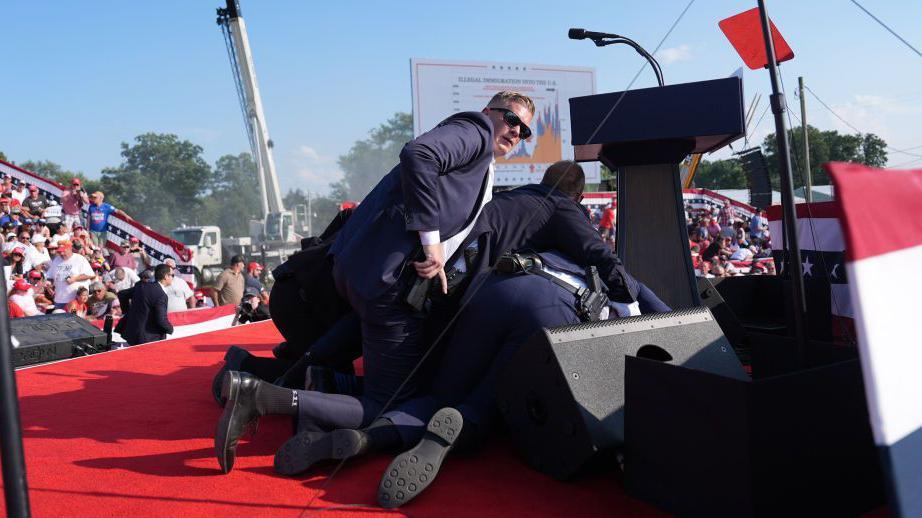The president's protectors are hardly noticeable - until things go wrong

Secret Service agents rushed to protect Donald Trump after an attempted assassination
- Published
Within seconds of shots ringing out at Donald Trump’s campaign rally in western Pennsylvania, at least five protective agents in dark suits, white shirts and sunglasses sprinted into view. They leapt on stage where Trump stood, throwing themselves on top of him and shielding him from view, before ushering him into a waiting car.
It looked like a picture of bravery, and of rigorous training. And yet, the near-miss that preceded the heroic scene is deemed by some to have been the worst security breach since the attempted assassination of President Ronald Reagan in 1981.
“It was a failed mission,” said Cheryl Tyler, a former Secret Service special agent and training instructor for the service. “It’s unacceptable.”
President Joe Biden on Sunday called for an “independent review” of security measures at the rally. Republican House Speaker Mike Johnson said Congress would conduct its own investigation into any “lapses” in security. And Kimberly Cheatle, the director of the Secret Service, has been called to testify before lawmakers at a hearing on Monday.
But experts say last week’s episode will bring fresh scrutiny to the agency’s history, too, which includes a sometimes spotty record of mishaps and scandals that have risked the reputation of the presidents’ protectors.
Watch: How chaos unfolded at Trump rally shooting
The Secret Service is tasked with a high-stakes and so-called zero-fail mission: to safeguard the US president, past presidents, presidential candidates and their families, at all costs.
“The training is not easy. It’s rigorous and it’s long,” said Ms Tyler, who was the first black female agent assigned to a president’s protective service. “It’s not a 9 to 5 job. It is a lifestyle. It is a dedication to this country.”
Since the 1968 assassination of Robert F Kennedy, who was shot and killed in the midst of his presidential campaign, the service has delivered on that high-stakes mission, she said. Those years of success allowed the agents to somewhat fade from view as only a quiet, stoic presence somewhere along the perimeter.
“It’s almost as if you can forget about them when they’re doing their job,” said Matt Dallek, a professor of political management at George Washington University, who is writing a book on failed presidential assassination attempts. “But the Secret Service’s mistakes? Everyone learns about them.”
And the agency has had its fair share of those.
Beginning around 2011, the Secret Service suffered a series of lapses, ranging from the embarrassing to the downright alarming.
In November that year, a man named Oscar Ramiro Ortega-Hernandez fired multiple shots from a semi-automatic rifle at the White House - meant to be one of the most closely-guarded properties in the world. And yet, the Secret Service was unaware for several days that at least seven bullets had hit the residence, while then-President Barack Obama’s daughter slept inside.
Secret Service agents are tasked with a "zero-fail" mission
In 2014, there was another major breach at the White House. Armed with a knife, Army veteran Omar Gonzalez jumped a fence onto the grounds and entered the White House through the front door and ran through much of the main floor before being tackled by an agent.
A year later, in 2015, a drunk Secret Service agent drove a car through the White House compound, hitting a security barricade. In an unfortunate coincidence, security on the grounds had been on high-alert after someone had placed a package on the premises, and claimed it was a bomb. The drunk agent drove within inches of the suspicious package, according to a congressional report.
And in another infamous episode from April 2012, reports emerged that several agents had solicited prostitutes in Cartagena, Colombia, ahead of then-President Barack Obama's visit.
Prostitution is legal in certain pockets of the country, but the incident - which reportedly followed a long night of heavy drinking - raised security and clearance concerns. It also added to the growing impression of the agency as a raucous fraternity, experts said.
A subsequent investigation by the House Oversight Committee found an email from a senior supervisor to 54 employees that his motto for the trip was “una mas cervesa por favor” - or, "one more beer, please". After an investigation, 10 agents were relieved from duty, with their security clearances revoked.
By 2015, a House Oversight Committee report on the agency had declared it as being in crisis.
“The incidents that we saw seemed like they were symptomatic of much larger problems at the Secret Service,” the report read.
“Wheels up, ring off”, was reportedly a running joke in the agency, meaning that on foreign assignments, marriage and other commitments were left behind at home.
The atmosphere was demoralising for those agents who did work hard, according to the report. “For people who are serious about national security, about protection, [that reputation] is so embarrassing.”
United States Secret Service Director Kimberly Cheatle has been called to testify before Congress
Experts say the attempted assassination of Donald Trump will force a reckoning.
Ms Cheatle, the director of the Secret Service, said ahead of the hearing that she would cooperate fully with any congressional or independent review into her agency.
Director Cheatle “knows she’s going to be grilled”, said Ms Tyler, the former agent. “Records will be pulled, training records will be pulled, shooting records will be pulled, personnel actions will be pulled… They’re going to look at every single thing.”
And the agency will be forced to reform, Ms Tyler said.
“Will it be in the headlines of the newspaper? No, because they’re not going to tell you. But there will be changes.”